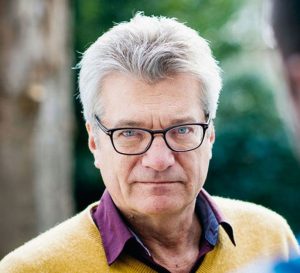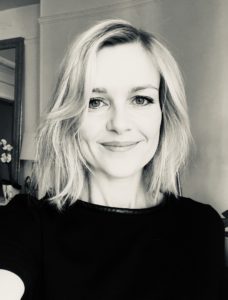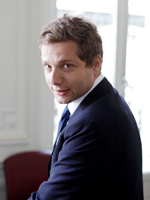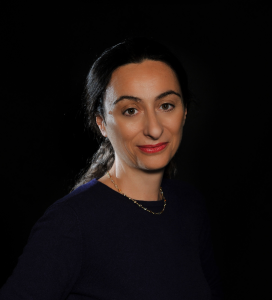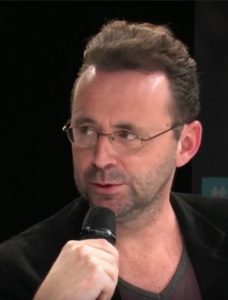Thursday, June 10, 2021
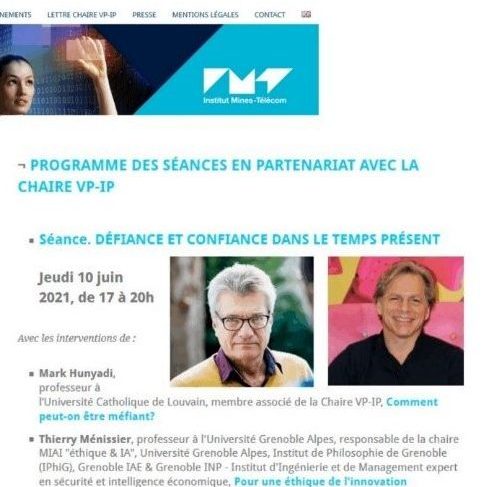
[2020-2021] Socio-philosophie du temps présent. Epistemological, methodological and critical issues
Coordinated by Pierre-Antoine Chardel, professor at IMT-BS, researcher at IIAC / LACI (UMR 8177, CNRS / EHESS) and co-founding member of the VP-IP Chair, and Valérie Charolles, researcher at IMT-BS, associate researcher at IIAC / LACI (UMR 8177, CNRS / EHESS) and member of the VP-IP Chair.
The seminar reflects on the conditions of possibility for the emergence of a socio-philosophy of the present time. It will continue to take democracy and technological innovation as fields of questioning to justify this articulation between philosophy and sociology.
The conviction that drives this ambition, both practical and theoretical, refers on the one hand to the complexities of today's world; they invite us to question the methodology we can mobilize to grasp the contemporary philosophically, while escaping the temptations of systematization.
On the other hand, the fact that the present appears in the form of crisis (economic, political, ecological and now also health-related) calls for reflection on the epistemological and critical stakes of our theoretical practices, with a view to questioning their foundations and presuppositions, as well as their underlying ethnocentrism.
With this in mind, we'll be assuming that philosophy must, more than ever, be practiced as closely as possible to human affairs, weaving as rich a dialogue as possible with the social sciences (sociology, as well as anthropology, history, economics and political science). At the same time, we'll be looking at certain major categories of thought inherited from so-called “Greco-Western” philosophy, analyzing them afresh and assuming a plural theoretical practice with a view to proposing alternative cartographies for our understanding of the world and its material and symbolic dimensions. For there are many forces at work in what we refer to as “representative” democracy, “neo-liberal economics” or the “digital revolution”.
The aim of this research seminar, which will be open to exchanges with participants, is to take account of the plurality of factors involved in the construction of our worlds - whether intimate, economic, social or cultural - and the heterogeneous regimes of enunciation that underpin them: the “contemporary world” calls for the elaboration of a way of thinking about the present time that confronts these differences epistemologically, methodologically and critically. With this in mind, we will be continuing the work begun in 2017 on a socio-philosophical approach to democracy and the environment.
This research seminar, open to exchanges with participants, aims to take account of the plurality of factors involved in the construction of our worlds -intimate, economic, social, cultural-, and of the heterogeneous regimes of enunciations that underpin them: the “contemporary world” calls for the elaboration of a thinking of the present time that confronts these differences epistemologically, methodologically and critically. In 2020-2021, as in the previous year, the focus will be on two poles: the economic field and quantification, on the one hand, and creative practices and aesthetics, on the other.
PROGRAM OF SESSIONS IN PARTNERSHIP WITH THE VP-IP CHAIR
Session. TRUST AND CONFIDENCE IN THE PRESENT TIME
Thursday, June 10, 2021, from 5 to 8 pm
> Watch the replay of this session
With contributions from :
- Mark Hunyadi, professor at the Université Catholique de Louvain, associate member of the VP-IP Chair, How can we be distrustful?
- Thierry Ménissier, professor at Grenoble Alpes University, head of the MIAI "Ethics & AI" Chair, Grenoble Alpes University, Grenoble Institute of Philosophy (IPhiG), Grenoble IAE & Grenoble INP - Institute of Engineering and Management expert in security and economic intelligence, Pour une éthique de l'innovation
- Valérie Charolles, researcher at IMT-BS and member of the VP-IP Chair
- Pierre-Antoine Chardel, professor at IMT-BS and co-founding member of the VP-IP Chair
Program :
5:00 pm: introduction
Valérie Charolles, researcher at IMT-BS and member of the VP-IP Chair. Pierre-Antoine Chardel, Professor at IMT-BS and co-founder of the VP-IP Chair.
5:20 pm: "How can we be distrustful?
Mark Hunyadi, professor at Université Catholique de Louvain, associate member of the VP-IP Chair.
5.50pm: Quick questions
6:00 p.m.: "Towards an ethics of innovation
Thierry Ménissier, Professor at Grenoble Alpes University, Head of the MIAI Chair "Ethics & AI", Grenoble Alpes University, Grenoble Institute of Philosophy (IPhiG), Grenoble IAE & Grenoble INP - Institute of Engineering and Management
Session. SURVEILLANCE, SECURITY AND FREEDOMS IN TIMES OF CRISIS
Thursday, December 10, 2020
> See the replay of this session
EHESS Seminar sessions Socio-philosophie du temps présent. Epistemological, methodological and critical issues 2020/2021
With contributions from :
- Caroline Lequesne-Roth, lecturer in public law at Université Côte d'Azur, Du biopouvoir à la Gorgone, Réflexions sur le pouvoir à l'ère digitale
- Olivier Hassid, expert in security and economic intelligence, Loi de sécurité globale : problèmes conceptuel, méthodologiques et stratégiques
- Pierre-Antoine Chardel and Valérie Charolles, Retour sur le travail effectué avec Mireille Delmas-Marty concernant l'application StopCovid (Download the presentation - PDF)
Program:
5:00 pm: introduction by Pierre-Antoine Chardel and Valérie Charolles
5:15 pm: presentation by Caroline Lequesne-Roth
5:45 pm: quick questions
6:00 pm: presentation by Olivier Hassid
6:45 pm: debate with participants on the two presentations
7:15 pm: presentations by Pierre-Antoine Chardel and Valérie Charolles
7:45 pm: debate
8:00 pm: closing session
SPEAKERS
Mark Hunyadi
Mark Hunyadi is Professor of Social, Moral and Political Philosophy at the Catholic University of Leuven. From his earliest publications, he linked fundamental moral philosophy with critical theory of society. Through his more recent work on bioethics and the philosophy of technology, he has developed a critical theory of contemporary liberalism, which he considers incapable of grasping ethical issues beyond those linked to what he calls “Petite éthique”, i.e. the protection of individual rights and freedoms. His works expose the “tyranny of lifestyles” (the title of his 2015 book) that we suffer in spite of, and because of, professed liberalism. His latest book is devoted to trust, and was published in November 2020 under the title Au début est la confiance (ed. de Bord de l'eau).
Thierry Ménissier
Agrégé in philosophy, holds two Advanced Studies Diplomas (DEA) in epistemology and history of science (Paris 1 Panthéon Sorbonne) and in political studies (EHESS Paris), and holds a doctorate in political studies from EHESS Paris (Raymond Aron Center for Political Studies), and a Habilitation to Supervise Research in political science and philosophy (IEP Grenoble). Currently a University Professor and member of the Grenoble Institute of Philosophy (IPhiG) at the University of Grenoble Alpes. Scientific Director of the "Ethics & AI" Chair at the Grenoble Multidisciplinary Institute for Artificial Intelligence (MIAI), and of the "Philosophy of Technology" seminar at IPhiG.
His current work in philosophy focuses on how the widespread use of algorithms is changing the conceptualities that govern human activity and are inherited from modern tradition, such as autonomy, agency, responsibility, and authority. He thus aims to develop an ethical and political philosophy that integrates the questions raised by contemporary technological phenomena, in the sectors of social life and human existence where they transform activity, by considering them from a political perspective.
Caroline Lequesne-Roth
After studying law and philosophy, and completing a doctorate on the Contractual Default Regime of European Debtor States at the Université Libre de Bruxelles, Caroline Lequesne-Roth joined the Université Côte d'Azur in 2016. A lecturer in public law, she founded, alongside Marina Teller, the DL4T program, which aims to bring together lawyers, data scientists, and computer scientists to explore the challenges of deep technologies. Director of the DL4T Fablex (Artificial Intelligence Law Clinic) from 2018 to 2020, she is currently responsible for the Master II program in Algorithmic Law and Data Governance. Her work focuses on the normative and conceptual issues of the digitalization of public services in the era of artificial intelligence and big data. She is the author of various contributions relating to the regulation of surveillance technologies and the relationship between science and power.
Olivier Hassid
PhD in Economics from the University of Paris Panthéon-Sorbonne, founder of the journal Sécurité & Stratégie, lecturer at the University of Nancy, author of several books, the latest of which was published by Legitech in 2019, Sécurité et Sûreté, guide pratique et juridique (https://www.lgdj.fr/securite-et-surete-guide-pratique-et-juridique-9782919782130.html), having worked in both the public and private sectors (Prime Minister's Office, PwC).
Valérie Charolles
Valérie Charolles, member of the VP-IP Chair, is a researcher in philosophy at the Institut Mines-Télécom Business School, an associate researcher at the Interdisciplinary Institute of Contemporary Anthropology (UMR 8177 CNRS/EHESS), and a lecturer at the EHESS (Research Seminar "Sociophilosophy of the Present Time: Epistemological, Methodological, and Critical Issues"). She works on how technology, quantification, and economics construct the contemporary world and subject. She has published four books with Fayard, including Philosophy of the Screen (2013) and The Qualities of Man (2016). A revised and expanded edition of her first book, Liberalism Against Capitalism, was published in paperback (Folio Essais/Gallimard) on January 14, 2021.
Pierre-Antoine Chardel
Pierre-Antoine Chardel is a philosopher and sociologist, doctor of the École des Hautes Études en Sciences Sociales (EHESS), holder of a PhD from Laval University (Canada), accredited to supervise research (HDR) from the University of Paris (Faculty of SHS Sorbonne), professor of social sciences and ethics at Institut Mines-Télécom Business School (IMT-BS). He also lectures at Télécom SudParis (member of the Institut Polytechnique de Paris). Former seminar leader at the Collège International de Philosophie, former member of the Research Center "Meaning, Ethics and Society" / CERSES (UMR 8137, CNRS / Université Paris Descartes) and of the Commission for Reflection on the Ethics of Research in Digital Sciences and Technologies of Allistène (CERNA), he was recently a guest researcher at the MédiaLab of Sciences Po - Paris. Since 2013, he has been co-founder of the Values and Policies of Personal Information (VP-IP) chair at IMT. He is also the founder and director of the Laboratory for Meaning and Understanding of the Contemporary World (LASCO IdeaLab), a member of the Interdisciplinary Institute for Contemporary Anthropology (IIAC / LACI, UMR 8177, CNRS / EHESS) and co-director (with Valérie Charolles) of a seminar at the École des Hautes Études en Sciences Sociales (EHESS) entitled: “Socio-philosophy of the present time. Methodological, epistemological and critical issues”. He has published around ten books, including: Industrial Transition and Emerging Organizations: Ethics in Question, edited with Sophie Breteché, Carine Dartiguepeyrou, and Thibault de Swarte (Presses des Mines, 2019); The Empire of the Signal. From Writing to Screens (CNRS Editions, 2020).

